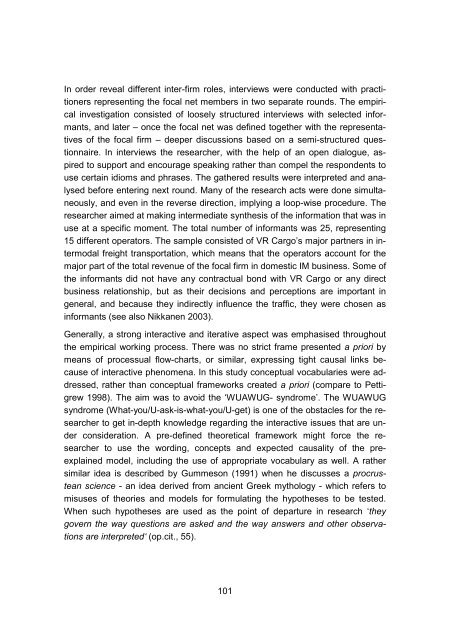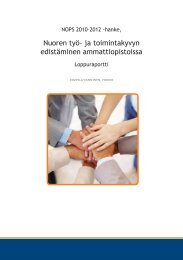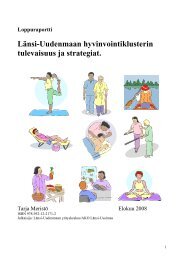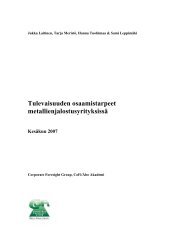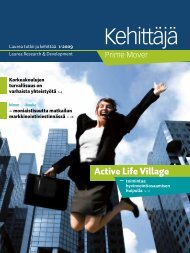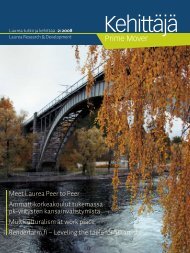849954 sisus
849954 sisus
849954 sisus
Create successful ePaper yourself
Turn your PDF publications into a flip-book with our unique Google optimized e-Paper software.
In order reveal different inter-firm roles, interviews were conducted with practitioners<br />
representing the focal net members in two separate rounds. The empirical<br />
investigation consisted of loosely structured interviews with selected informants,<br />
and later – once the focal net was defined together with the representatives<br />
of the focal firm – deeper discussions based on a semi-structured questionnaire.<br />
In interviews the researcher, with the help of an open dialogue, aspired<br />
to support and encourage speaking rather than compel the respondents to<br />
use certain idioms and phrases. The gathered results were interpreted and analysed<br />
before entering next round. Many of the research acts were done simultaneously,<br />
and even in the reverse direction, implying a loop-wise procedure. The<br />
researcher aimed at making intermediate synthesis of the information that was in<br />
use at a specific moment. The total number of informants was 25, representing<br />
15 different operators. The sample consisted of VR Cargo’s major partners in intermodal<br />
freight transportation, which means that the operators account for the<br />
major part of the total revenue of the focal firm in domestic IM business. Some of<br />
the informants did not have any contractual bond with VR Cargo or any direct<br />
business relationship, but as their decisions and perceptions are important in<br />
general, and because they indirectly influence the traffic, they were chosen as<br />
informants (see also Nikkanen 2003).<br />
Generally, a strong interactive and iterative aspect was emphasised throughout<br />
the empirical working process. There was no strict frame presented a priori by<br />
means of processual flow-charts, or similar, expressing tight causal links because<br />
of interactive phenomena. In this study conceptual vocabularies were addressed,<br />
rather than conceptual frameworks created a priori (compare to Pettigrew<br />
1998). The aim was to avoid the ‘WUAWUG- syndrome’. The WUAWUG<br />
syndrome (What-you/U-ask-is-what-you/U-get) is one of the obstacles for the researcher<br />
to get in-depth knowledge regarding the interactive issues that are under<br />
consideration. A pre-defined theoretical framework might force the researcher<br />
to use the wording, concepts and expected causality of the preexplained<br />
model, including the use of appropriate vocabulary as well. A rather<br />
similar idea is described by Gummeson (1991) when he discusses a procrustean<br />
science - an idea derived from ancient Greek mythology - which refers to<br />
misuses of theories and models for formulating the hypotheses to be tested.<br />
When such hypotheses are used as the point of departure in research ‘they<br />
govern the way questions are asked and the way answers and other observations<br />
are interpreted‘ (op.cit., 55).<br />
101


